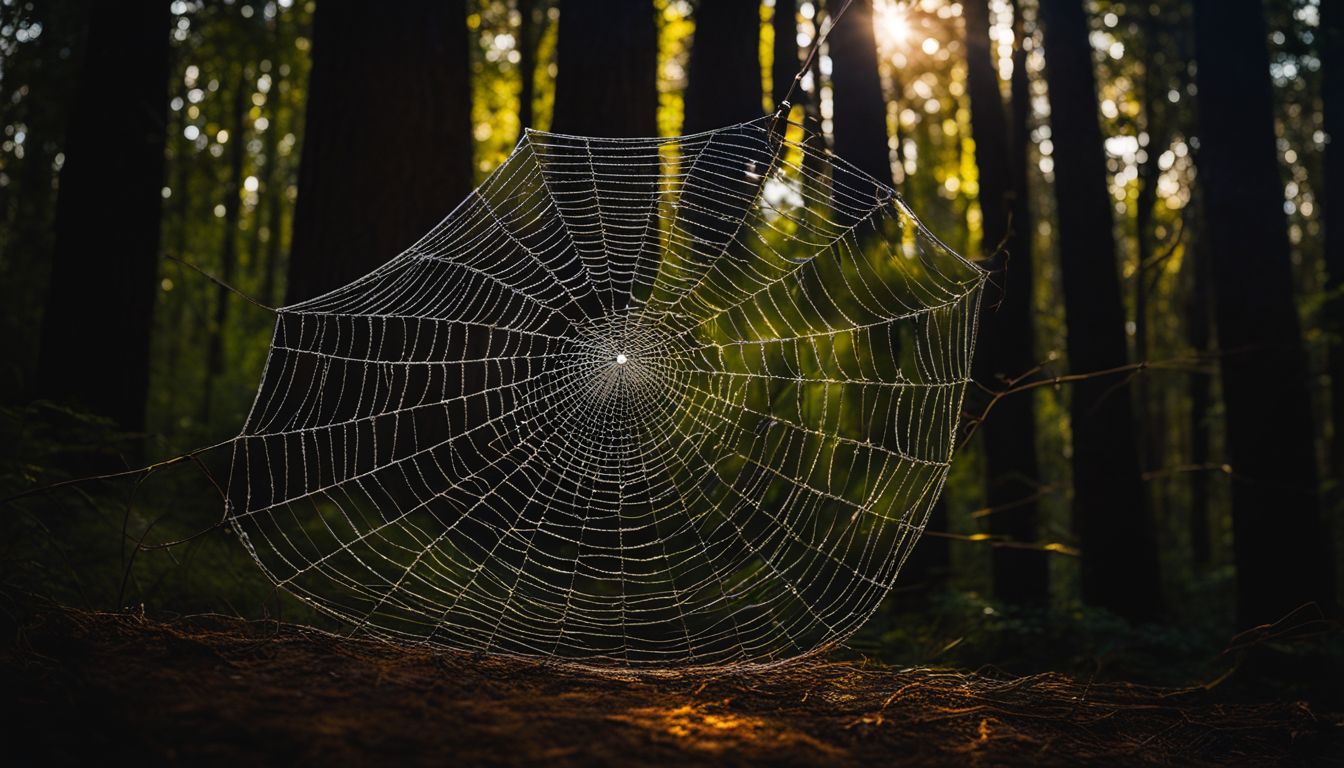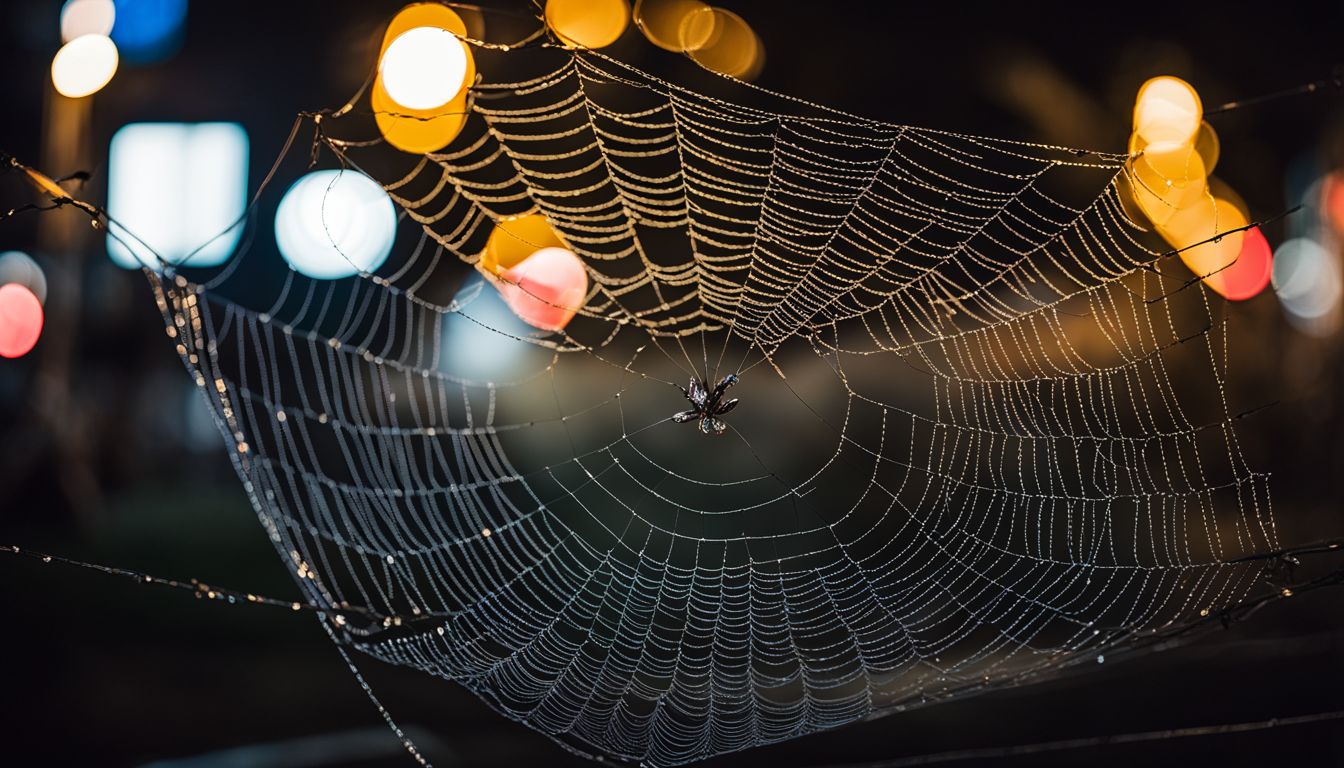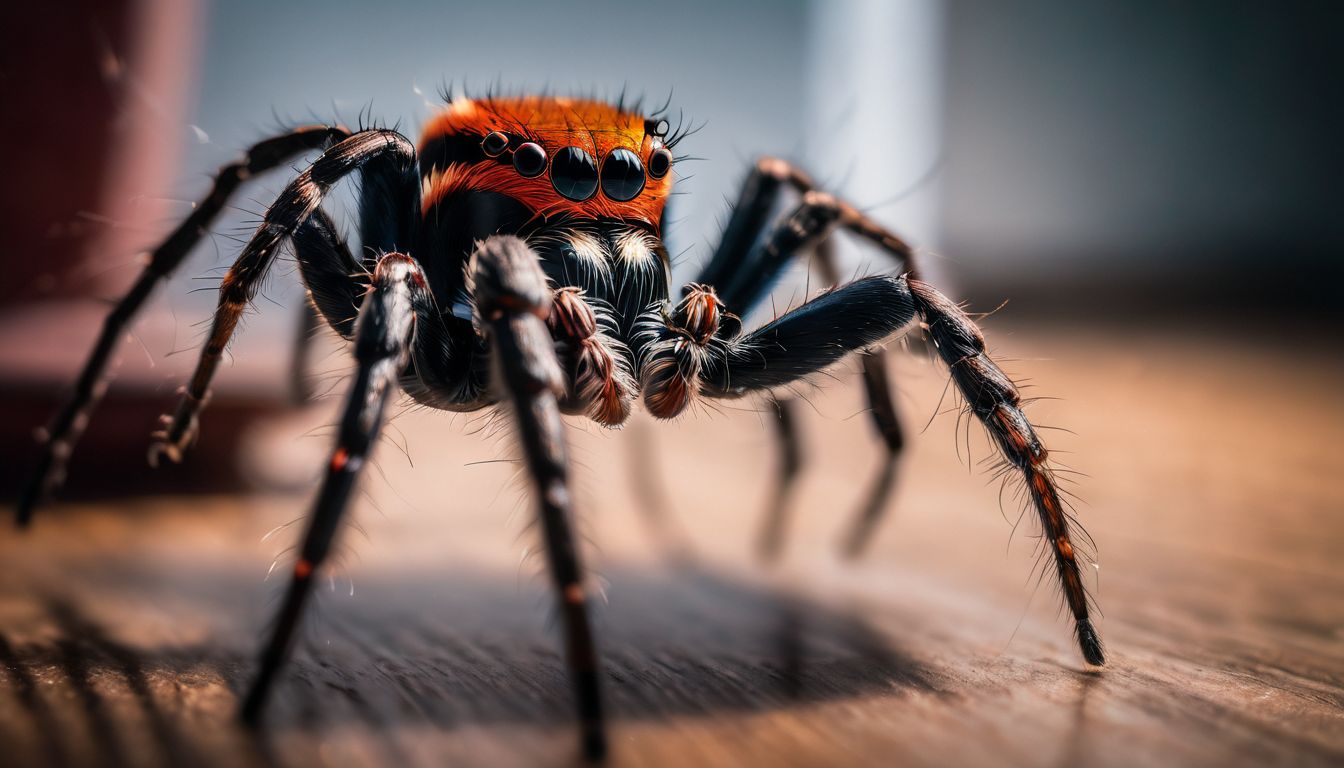Have you ever noticed spiders hanging around your lights at night and wondered if they’re attracted to the glow? It’s a common belief that these eight-legged creatures seek out bright areas, but in reality, most house spiders prefer darker spaces.
Our blog post will guide you through the fascinating world of spider behavior regarding light so you can understand what really draws them in – or doesn’t. Discover the unexpected truth about spiders and light as we illuminate this topic!
Key Takeaways
- Lights attract bugs, not spiders. Spiders are drawn to light because it attracts their prey, such as moths and flies.
- Nocturnal spiders may be attracted to outdoor lights, while diurnal spiders might not be as drawn to light.
- Artificial lighting can significantly impact spider behavior, affecting their activity levels and hunting patterns. Different species of spiders have varying responses to light.
- Strategic positioning of outdoor lights, use of natural repellents like peppermint oil, and regular cleaning can help deter spiders from congregating around your home.
Exploring the Relationship Between Spiders and Light

Let’s debunk the myths and uncover the facts about whether spiders are truly attracted to light. We’ll also delve into the role of light in spider prey dynamics and how it influences their hunting behavior.
Myths Versus Facts
Some people think spiders come to light because they like it. This is not true. Spiders do not go after light directly. Often, they become confused by it. Lights can make spiders think it’s day when it’s night, or the other way around.
Lights attract bugs, and this is why you might see spiders near a light source; they are hunting these smaller insects, not the light itself. Spiders always look for good places to catch their meals – if that happens to be near a lamp or bright porch light, that’s where you’ll find them.
It’s more about finding food than loving the light.
The Role of Light in Spider Prey Dynamics
Moving beyond common misconceptions, let’s dive into how light affects spiders and their hunting success. Light plays a big part in the world of orb-weaving spiders. Spiders in bright places catch more bugs because insects are drawn to the light.
This means these spiders get bigger and stronger compared to those living where it’s dark.
Spiders use webs to trap their food, and setting up near lights can be like opening a bug buffet. But not all spiders think light is good. Many feel that too much light might scare away what they want to eat or bring danger from other animals.
So while some spider friends hang out by the lamp post, others stick to the shadows for safety and better chances at snagging a snack.
Types of Spiders and Their Attraction to Light

Nocturnal spiders, such as wolf spiders, are active at night and may be attracted to outdoor lights. Diurnal spiders, like jumping spiders, hunt during the day and might not be as drawn to light.
Do spiders use light as a hunting guide?.
Nocturnal Spiders: Predatory Night Dwellers
Some spiders come out to hunt at night. These nocturnal spiders like the dark but are drawn to lights. Lights help them find their dinner, such as moths and flies that buzz around bulbs.
One spider that loves light is the Larinioides sclopetarius. It often hangs out near lamps or other bright spots waiting for bugs.
Lights not only attract prey but also give these night hunters a place to spin their webs. They are active after sunset, which makes them different from spiders that like the sun. After talking about these nighttime crawlers, let’s move on to diurnal spiders—those who prefer daylight for their adventures.
Diurnal Spiders: Daytime Hunters
Diurnal spiders are active during the day. They prefer looking for food and mates when it’s light outside. Daytime hunters like to use their eyes to catch prey, relying on their good vision.
But not all diurnal spiders are attracted to light, unlike nocturnal ones which tend to avoid bright areas.
Now let’s take a look at how artificial lighting affects spider activity during the night.
Do Spiders Use Light as a Hunting Guide?
Nocturnal spiders are usually only active at night to avoid predators and may use artificial light to increase foraging success. Some spider species exhibit positive phototaxis, meaning they are naturally drawn to light sources at night.
Crab spiders use UV light reflection to mimic their background colors in order to attract bees. Artificial lights may present a very strong visual cue that attracts spiders, as well as insects.
The behavior of spiders in response to light varies among different species and can be influenced by their natural environment and hunting patterns.
How Artificial Lighting Influences Spider Activity
Artificial lighting can have a significant impact on spider behavior, affecting their activity levels and hunting patterns. Understanding the relationship between spiders and light can help in creating an environment that discourages these pests from thriving in your home.
The Impact of Outdoor Lighting on Spider Ecosystems
Artificial lights, like LED lights, can attract spiders. It’s not just the light that draws them in; it’s also the insects that get attracted to the light. Research has shown that different colored lights attract different numbers of insects, which indirectly influences spider presence.
Understanding how outdoor lighting affects spiders is important for pest control and maintaining a balance in nature.
Outdoor lighting can change a nocturnal orb-weaving spider’s behavior and success in finding food. It alters their routine and makes them more successful at catching prey when there is artificial light at night.
Are Spiders More Active in Light or Dark Environments?
Spiders can be more active in both light and dark environments, depending on the species. Nocturnal spiders, like cellar spiders, are more active in dimly-lit or dark places as they hunt during the night.
On the other hand, some diurnal spiders, such as orb-weaving spiders, may become more active around artificial lights at night to catch prey attracted by the light. In lit areas, these spiders might be fewer but larger and have a higher chance of catching prey due to their adept hunting skills.
Artificial lighting can affect spider behavior differently based on their preferences and hunting strategies. Some may use it as a hunting advantage while others could retreat from illuminated areas to avoid predators or competition.
Preventative Measures to Discourage Spiders
Strategic Use of Lighting: Properly placed outdoor lights can deter spiders from congregating around your home.
Natural Repellents and Housekeeping Tips: Utilizing essential oils such as peppermint oil, along with regular cleaning and decluttering, can help keep spiders at bay.
Strategic Use of Lighting
Positioning outdoor lights away from doors and windows is essential, as light that’s too close can draw insects and spiders. LED lights, with their natural-like glow, might also attract spiders.
Interestingly, different colors of light could influence spider activity in various ways. Some studies suggest that certain spiders may be more attracted to specific light spectra than others, impacting their behavior.
Properly using lighting outside your home can be an important step in preventing spider infestations.
Natural Repellents and Housekeeping Tips
To keep spiders away from your home, you can use natural repellents and follow some housekeeping tips. Here are some ways to do this:
- Use plants like lavender, mint, eucalyptus, and citronella around your home to repel spiders.
- Create homemade spider repellent sprays using natural deterrents like peppermint oil, cinnamon, and vinegar.
- Keep your home clean and organized to discourage spiders from setting up webs inside.
- Block entry points and seal gaps and cracks in your home to prevent spiders from finding their way inside.
- Declutter indoor spaces and keep outdoor areas clean to discourage spiders from taking up residence in your home.
How to Keep Spiders Out of Your Garage
To keep spiders out of your garage, follow these steps:
- Seal any cracks or gaps in the walls and foundation to prevent spiders from entering.
- Replace white outdoor lights with yellow bulbs to reduce insect attraction, a common spider food source.
- Use natural repellents such as peppermint oil or vinegar to deter spiders from making your garage their habitat.
- Keep the garage clean and clutter – free to eliminate hiding spots for spiders.
- Store firewood and other debris away from the garage to remove potential spider habitats.
- Use airtight containers for storing items to prevent spiders from seeking shelter in cardboard boxes and other openings.
Conclusion
In conclusion, the attraction of spiders to light is not a universal behavior. Some species are drawn to light due to their hunting habits, while others may be deterred by it. Understanding the relationship between spiders and light can help in implementing effective pest control measures and minimizing their presence around your home.
By considering the specific behaviors of different spider species toward light, you can take proactive steps to manage and prevent unwanted encounters with these arachnids.
For more detailed strategies on ensuring these eight-legged guests stay clear of your garage, check out our guide on how to keep spiders out of your garage.
FAQs
1. Do spiders like light?
No, spiders are not attracted to light. They often build their webs in dark corners because they use them to catch other bugs that like light.
2. Can ultraviolet light draw spiders into a room?
Spiders can see ultraviolet light and might confuse it for daylight but they don’t come toward the UV light on purpose.
3. If I keep my home clean, will that stop spiders from coming inside?
Yes, cleaning your home removes food bits and crumbs which can attract bugs like cockroaches, and without these bugs around, spiders won’t come looking for food.
4. Are any types of spiders drawn by certain smells or sounds?
Spiders have dichromatic vision so they are kind of color blind and do not rely on aroma or ultrasound; instead they look for places where they might find food.
5. Can I get help if I find dangerous spiders like black widows or brown recluses at home?
Sure! You can contact Romney Pest Control to get a free quote about safely getting rid of harmful spider webs and keeping those scary spiders away from your place.




